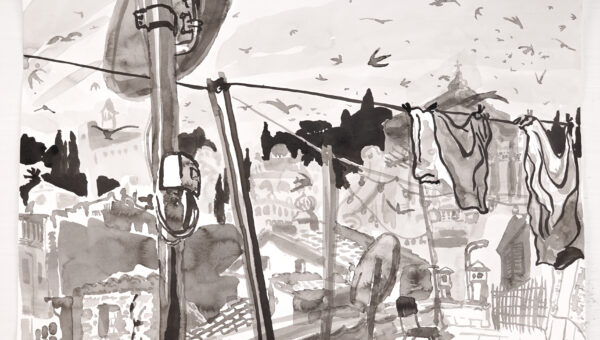During weekly share time, the new kid told how his grandma made him steamed milk with cocoa. Our first-grade class sat cross-legged on the floor. We’d never had steamed milk; we knew food-stamp skim souring in our fridges. In the milk foam, his grandma planted a squash flower from her garden; a blossom to crush deliciously in his mouth. He described for us this strange delicate thing, smiling like nothing could hurt him. It sounded made-up, like a kinder dream than any I’d ever had.
At home, I asked Dad how milk got steamed. I was six and believed that Dad understood how all things worked.
I wanted sweet foam. I wanted but didn’t mention the flower.
Dad laid his hand over a Folger’s can: when I got older, he’d make me coffee, black, teach me how “real men” took it.
“That kid ever gets too friendly—” Dad gripped my shoulder so hard I thought I might break. “Let him know you ain’t interested.”
So I did.
I had to.
My knuckles didn’t sting until after the boy cried: I’d punched his mouth. Blood in his teeth—his and mine—and classmates’ laughter flitting around me for hurting someone who’d made us wonder what we were missing.
At home in bed, the pain in my hand kept me awake. TV light bled cold and blue under my bedroom door. By night, Dad mined truths from a quarry within himself, sculpting them into shapes for me learn. By morning, my hand was swollen—a sliver of tooth lodged beneath my skin. I bit my tongue while Dad brewed his Folgers and didn’t say a word.
There were other fights with other boys. I didn’t remember them all. Little scars chipped my skin but didn’t carry names. In high-school biology, the teacher explained that our cells die and replicate. Nothing of who I once was remained. Ten years, and I’d be gone again. I scratched my initials into the desk with a paper clip, cheated of something I couldn’t name.
Years passed. Dad’s house slowly shrank around us, closing like a fist. Windowpanes cracked. Nails raised their heads from the studs.
Until I got away.
On a Greyhound, I rubbed my knuckle—its polished scar—staring out at landscapes and towns all the way.
To a boy who looked at me so I knew for the first time I was seen by someone. He held me so my fists finally unclenched.
In the middle of the night, my hand’s old hurting woke me. I left his mattress where the shape of me remained curled around him. I put on the TV in the dark where infomercials and westerns didn’t tell me anything.
In the morning I told him my name.
He made me coffee.
When Dad died, I went home.
I did.
I had to.
Alone in that broken house, I imagined telling him that my hand never stopped hurting, that he’d never taught me the shapes of pain and where it lived inside me.
Floorboards buckled. Light fell grayly over a Folger’s can. Water coughed in the faucet. The stove burner clicked as I put on a dusty kettle.
At six, I’d believed that someday Dad would make me coffee, black and bitter and derived from some secret place where secrets came from, and I would understand.
From a plastic grocery bag, I placed squash blossoms around the kitchen—in the sink, on windowsills, in the cupboards.
I said the first boy’s name because I hadn’t forgotten. I felt him beneath my skin that was no longer the skin I’d broken when I’d broken us both trying to prove I was whole.
The kettle cried.
I crushed yellow flowers in my mouth.

